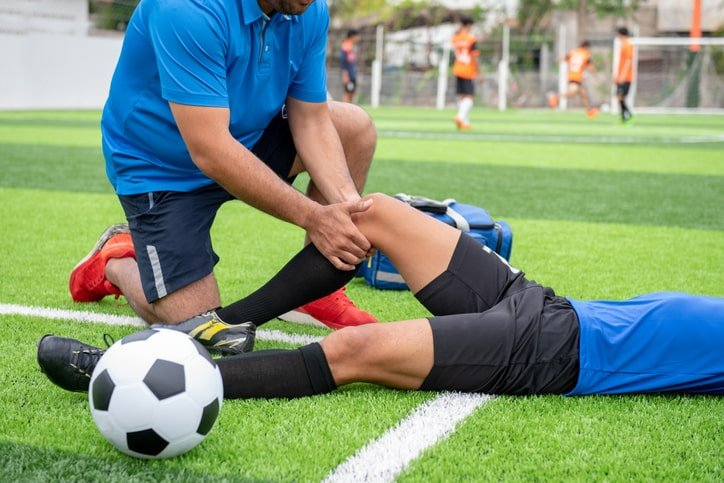Sports Injuries Among the Conditions Treated by Musculoskeletal Physiotherapy
Introduction to Sports Injuries and Musculoskeletal Physiotherapy
Defining Sports Injuries
- Types and Common Causes
Sports injuries range from acute traumas like sprains and fractures to chronic wear-and-tear injuries such as tendinitis. Common causes include improper technique, inadequate equipment, and insufficient warm-up. - Impact on Athletes
These injuries can significantly impact an athlete’s performance and career, necessitating effective and timely care, often involving Physiotherapy to facilitate recovery.
The Role of Musculoskeletal Physiotherapy in Sports
- Overview of Treatment Techniques
Musculoskeletal physiotherapy uses a variety of techniques, including Manual Therapy and Fascial Stretch Therapy, to address sports injuries. - Benefits of Physiotherapy for Athletes
Physiotherapy helps reduce pain, restore function, and prevent future injuries, playing a crucial role in an athlete’s rehabilitation and performance enhancement.
Diagnosing Sports Injuries
Initial Assessment Techniques
Physical Examination
The first step involves a thorough physical examination to assess the extent of the injury, with physiotherapists using hands-on techniques to evaluate pain and movement dysfunction.
Diagnostic Tools Used in Physiotherapy
Advanced imaging and other diagnostic tools help in accurately diagnosing and tailoring treatment plans. These tools are integral to services offered, such as Active Rehab.
Understanding Injury Severity and Type
- Acute vs. Chronic Injuries
Differentiating between acute and chronic injuries is essential for effective treatment. Acute injuries require immediate attention, while chronic injuries may need longer, more sustained treatment strategies. - Specific Sports Injuries Explained
Understanding specific injuries, whether it’s a ligament tear or muscle strain, helps in applying the appropriate physiotherapy techniques.
Treatment Strategies in Sports Physiotherapy
Immediate Care and Management
- RICE Method and Its Effectiveness
The RICE (Rest, Ice, Compression, Elevation) method is often the first line of treatment recommended by physiotherapists to reduce swelling and pain immediately after injury. - Early Physiotherapy Interventions
Early intervention by professionals, including Registered Massage Therapy, can significantly improve outcomes by reducing pain and inflammation and speeding up the healing process.
Rehabilitation Techniques
- The 5 Stages of Rehabilitation in Sports
Rehabilitation is structured around five key stages: pain relief, mobility restoration, strength building, functional skills development, and return to sport, each tailored to the athlete’s specific needs. - Tailored Rehabilitation Programs
These programs are designed considering the individual’s sport and position, incorporating relevant Kinesiology and Bodyworker techniques to ensure a safe return to sports.
Preventive Measures and Performance Enhancement
Injury Prevention Strategies
- Training Modifications
Adapting training methods to reduce the risk of injuries is crucial. This includes adjusting workout intensity, duration, and frequency according to the athlete’s condition and progress. - Preventive Exercises
Implementing specific exercises that enhance flexibility, strength, and stability can help prevent sports injuries. Techniques learned in Kinesiology sessions are particularly effective in this regard.
Enhancing Athletic Performance
- Role of Regular Physiotherapy
Regular Physiotherapy sessions not only aid in injury prevention but also enhance overall athletic performance by improving flexibility, balance, and strength. - Advanced Physiotherapeutic Techniques
Utilizing advanced techniques such as Fascial Stretch Therapy and biomechanical assessments can lead to significant improvements in performance, helping athletes achieve their peak potential.
Long-Term Recovery and Maintenance
Ongoing Care for Athletes
Maintenance Programs
Developing personalized maintenance programs that include regular check-ups and tailored exercise plans to ensure the athlete remains at peak condition.
Importance of Continuous Physiotherapy
Continuous care involving Active Rehab and routine Physiotherapy sessions are essential for sustained health and performance, preventing the recurrence of old injuries.
Returning to Sport After Injury
- Criteria for Return
Establishing clear criteria for an athlete’s return to sport is crucial, including achieving pre-injury levels of strength, flexibility, and pain-free movement. - Managing Recurrence Risks
Strategies must be in place to manage the risks of re-injury, such as gradual reintroduction to sport and ongoing Physiotherapy.
FAQ: Common Questions on Sports Injuries in Physiotherapy
How physiotherapy helps in sports injury?
Physiotherapy plays a pivotal role in the healing and rehabilitation process by reducing pain, restoring function, and promoting strength and flexibility through tailored therapeutic exercises and treatments.
What are the 5 stages of rehabilitation in sport?
The five stages include acute care, recovery, rehabilitation, conditioning, and return to sport, each crucial for the safe and effective return of an athlete to full activity.
What is sports injury therapy?
Sports injury therapy involves specialized treatments and exercises designed to address injuries commonly sustained during athletic activities, focusing on recovery and prevention of future injuries.
What is physiotherapy treatment for injury?
It encompasses a range of treatments such as manual therapy, exercise programs, and advice on injury prevention, tailored to individual needs to ensure optimal recovery.
How long after an injury should you have physio?
It is advisable to start physiotherapy as soon as possible after injury, depending on the nature and severity, to facilitate quicker recovery and prevent complications.
What is the most common injury in physiotherapy?
Sprains and strains are among the most common injuries treated in physiotherapy, especially those involving the ankles, knees, and wrists.
For personalized care and the latest in diagnostic tools in physiotherapy, consider booking an appointment with Proactive Health. Our comprehensive services include Physiotherapy, Registered Massage Therapy, Kinesiology, Fascial Stretch Therapy, Active Rehab, and Bodyworker sessions.



